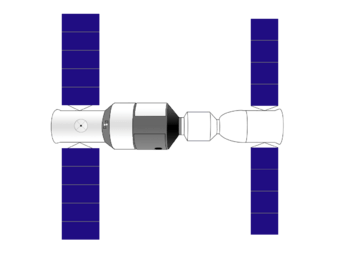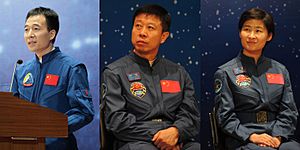Shenzhou 9 facts for kids

Diagram depicting Shenzhou 9 (right) docked with Tiangong-1 (left)
|
|
| Mission duration | 12 days, 15 hours and 25 minutes |
|---|---|
| Spacecraft properties | |
| Spacecraft type | Shenzhou |
| Crew | |
| Crew size | 3 |
| Members | Jing Haipeng Liu Wang Liu Yang |
| Start of mission | |
| Launch date | 16 June 2012, 10:37:24 UTC |
| Rocket | Long March 2F |
| Launch site | Jiuquan LA-4/SLS-1 |
| End of mission | |
| Landing date | 29 June 2012, 02:01:16 UTC |
| Orbital parameters | |
| Reference system | Geocentric |
| Regime | Low Earth |
| Docking with Tiangong-1 | |
| Docking date | 18 June 2012, 06:07 UTC |
| Undocking date | 24 June 2012, 03:08 UTC |
| Time docked | 3 days, 21 hours, 1 minute |
| Docking with Tiangong-1 | |
| Docking date | 24 June 2012, 04:38 UTC |
| Undocking date | 28 June 2012, 01:22 UTC |
| Time docked | 3 days, 20 hours, 44 minutes |
 (l-r) Jing Haipeng, Liu Wang, and Liu Yang Shenzhou program
|
|
Shenzhou 9 was an important space mission from China. It was the fourth time China sent people into space as part of its Shenzhou program. The spacecraft launched on June 16, 2012.
This mission was special because it was the first time a Chinese crewed spacecraft connected with the Tiangong-1 space station. This connection, called a docking, happened on June 18. The Shenzhou 9 spacecraft returned to Earth on June 29, landing in Inner Mongolia. A very exciting part of this mission was that it included Liu Yang, who became the first Chinese female astronaut to go to space!
Contents
Mission Highlights
Shenzhou 9 made history for China in several ways. It was the first time a Chinese crewed spacecraft docked with a space station. It also had the first Chinese woman in space and the first Chinese astronaut to fly into space more than once.
Crew Members
The crew for the Shenzhou 9 mission was made public on June 15, 2012.
- Jing Haipeng was the commander. He was the first Chinese astronaut to go to space twice.
- Liu Wang was the operator. This was his first trip to space.
- Liu Yang was the laboratory assistant. She was the first Chinese woman to travel to space.
Getting Ready for Launch
The Shenzhou 9 spacecraft arrived at the Jiuquan Satellite Launch Center in China's Gobi Desert on April 9, 2012. The rocket that would carry it, a Long March 2F, arrived on May 9.
On June 9, 2012, the spacecraft and its rocket were moved to the launch pad. They went through final checks and practice runs on June 12 and 13 to make sure everything was ready for the mission.
Launch Day Ceremony
On June 16, 2012, a special ceremony was held at the launch center. The three astronauts, Liu Wang, Liu Yang, and Jing Haipeng, went to the launch tower. They were ready for their amazing journey into space.
The Mission in Space
The Long March 2F rocket successfully launched the Shenzhou 9 spacecraft on June 16, 2012.
Docking with Tiangong-1
Two days later, on June 18, Shenzhou 9 connected with China's first space lab, Tiangong-1. This was a very important moment for China's space program. It was the first time a Chinese crewed spacecraft had ever connected with another spacecraft in orbit. This first docking was controlled from the ground.
After the spacecraft were safely connected, Commander Jing Haipeng entered Tiangong-1. The astronauts spent several days working in the space lab.
Manual Docking
Six days later, on June 24, Shenzhou 9 separated from Tiangong-1. Then, something even more amazing happened: the spacecraft connected with Tiangong-1 again, but this time it was controlled manually by astronaut Liu Wang. This was the first time a Chinese astronaut had performed a manual docking in space!
Return to Earth
After spending 12 days in space, the Shenzhou 9 spacecraft landed safely back on Earth. It parachuted down in Inner Mongolia on June 29, 2012. The mission was a huge success for China's space exploration efforts.
Backup Crew
Just like in many important missions, there was a backup crew ready in case the main crew couldn't fly. The backup crew for Shenzhou 9 included:
- Nie Haisheng (Commander)
- Zhang Xiaoguang (Operator)
- Wang Yaping (Laboratory Assistant)
This backup crew later became the main crew for the next mission, Shenzhou 10.
See also
 In Spanish: Shenzhou 9 para niños
In Spanish: Shenzhou 9 para niños
 | William M. Jackson |
 | Juan E. Gilbert |
 | Neil deGrasse Tyson |

